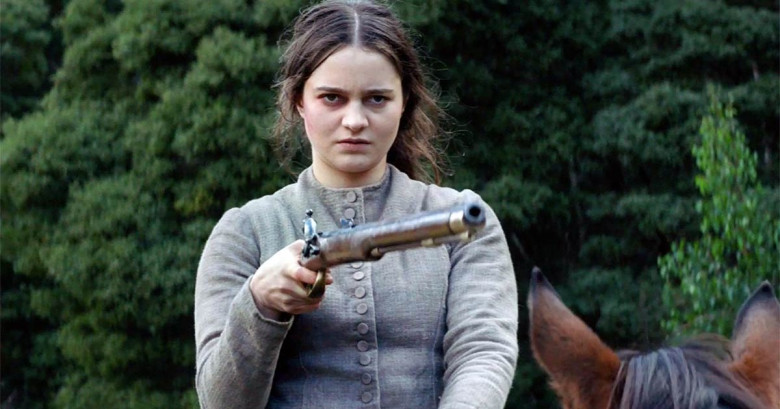The Nightingale (2018) is the second feature from Jessica Kent, who made waves back in 2014 with her debut film The Babadook. Unlike her previous film, which centred on the psychological horror around a children’s book and a grieving mother, The Nightingale presents us with colonialist 19th century Australia.
The film follows Claire, (Aisling Francoisi), an Irish convict who is seeking revenge against Lieutenant Hawkins (Sam Clafin) for the horrific violence he inflicts on her family in the opening of the film. What follows is somewhat of a psychological exploration of Claire’s trauma and determination as she tracks Hawkins through the wilderness with the aid of Billy, an aboriginal (Baykali Ganambarr). Perhaps the film’s highest commendation is the unapologetic portrayal of colonial violence that Kent offers – which also been the source of intense controversy, due to the graphic portrayals of rape and murder, and racially targeted violence. However, Kent has stated that she produced these portrayals in collaboration with Aboriginal Elders who authorized and commended the film’s commitment to historical realism. I also found some of these scenes incredibly difficult to process for the same reasons, but our struggle with coming to terms with the brutal reality of a colonialist past speaks volumes towards popular understandings of these narratives, and Kent is truly challenging her audience in presenting a foundational and often overlooked aspect of Australian history.
Stylistically, The Nightingale is breathtaking – the film is shot primarily within the Tasmanian jungle, and Kent capitalises on the cinematic potential this offers. She manages to maintain a very reserved hand and every shot feels expertly crafted, and of note is the sound mixing – Kent utilises a perfectly balanced forest soundscape littered with animal wails and rainstorms, transforming already stunning visuals into a startingly immersive experience. Fans of Andrei Tarkovsky will catch the Kent’s homage to the notorious ‘burning house’ scene in the director’s masterpiece, Mirror. And The Nightingale definitely captures some of that Tarkovsky poesis – there’s a beautiful lyricism and mysticism to the film’s exploration of the wilderness against the intensity of violence and action.
Francoisi’s performance as protagonist Claire is unforgettable, and she maintains a delicate balance between the trauma of a woman subjugated to horrific abuse and terror, and gritty resolve of Claire’s need for vengeance. Claflin also excels, succeeding in avoiding the ‘villain trope’ his character could easily fall victim to and asserting his capability for psychologically nuanced and cinematic roles.
The Nightingale succeeds in giving an intelligent and crafted visualisation of Aboriginal histories, with an expertly calculated approach. Kent’s decision to focus on psychological trauma presents a natural progression from The Babadook, and her choice to explore a diversity of female characters cements her as a refreshing and powerfully political voice in cinema.

